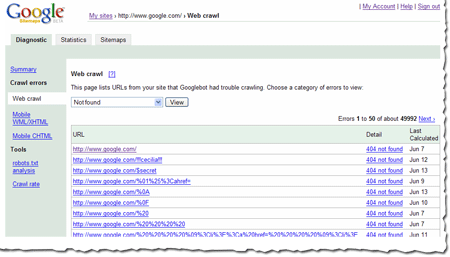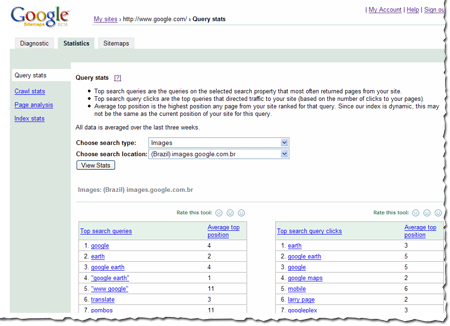June 21, 2006
In response to your requests, our latest release expands some of the features of Google Sitemaps. Here's a roundup of what's new.
Increased crawl errors
Previously, we showed you up to 10 URLs for each error type. We now show all URLs we've had
trouble crawling. We've also put 404 (not found) errors in a separate table from
other HTTP errors.
Just choose an error type and either browse the table using the Next and Previous links or download the entire table as a CSV file.

Expanded query stats
Query stats show you the top 20 search queries that brought up your site in the Google search results (both when users clicked on your site in the results and when they didn't), along with the average top position of your site for that query. Previously, you could view aggregate data across all properties and countries, as well as mobile-specific queries.
Now, you can view data for individual properties and countries as well. For instance, you can see the search queries from users searching Google Images in Germany that returned your site in the results. You'll only see properties and countries for which your site has data.
Site owners can also view aggregate information for all properties and languages. Properties include Images, Froogle, Groups, Blog search, Base, and Local. More than 100 countries are available.
Previously, query stats were available for sites that were located at the top-level domain (for instance, https://www.example.com/). These stats are now also available for sites located in a subfolder (for instance, https://www.example.com/mysite/).

Increased number of common words
On the Page analysis page, we've expanded the list of words we show in the report of common words
on your site and in external links to your site from 20 to 75 and we've removed
http and www from the words we list.
Increased limit of sites and Sitemaps that can be added to an account
In response to requests, we've raised the number of sites and Sitemaps that site owners can add to a Google Sitemaps account from 200 to 500—a direct result of a request from a Google Group member.
robots.txt analysis tool addition
Our robots.txt analysis tool is a great way to ensure that the robots.txt file on the site blocks
and allows only what's intended. We've added the ability to test against the new
Adsbot-Google user agent, which crawls AdWords landing pages for quality evaluation.
We only use this bot if you use Google AdWords to advertise your site. You can find out more about
this user agent in the
AdWords help center.
We want to know what you think
We are constantly looking to improve Google Sitemaps and appreciate the feedback we get from our Google Group, other places online, and at conferences. But we know that we don't get to hear from everyone that way. And so, to gather more feedback, we've added a rating tool to each feature in Sitemaps. Tell us if you love the feature, would like us to improve it, or if you don't find it useful. Simply click your choice beside each feature.

